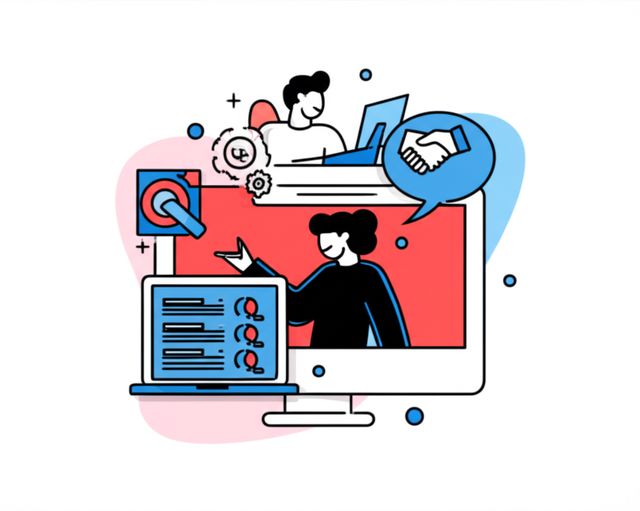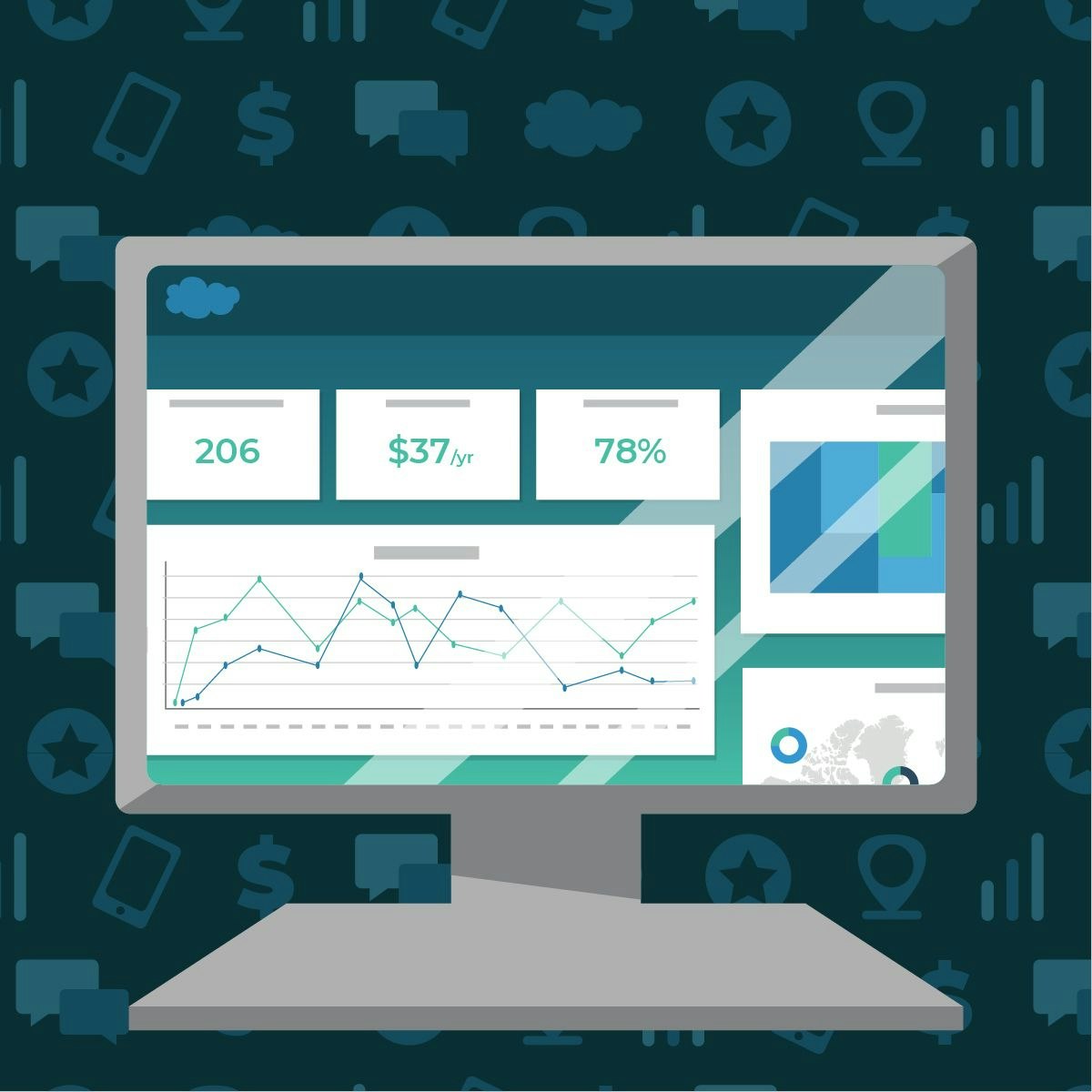Customer Relationship Manager
Understanding the Career Path of a Customer Relationship Manager
Customer Relationship Management, often abbreviated as CRM, is a vital approach businesses use to manage interactions with current and potential customers. It involves using strategies, practices, and technology to improve relationships, ultimately driving sales growth and customer loyalty. At its core, CRM aims to understand customers better, anticipate their needs, and provide personalized experiences across all touchpoints.
A Customer Relationship Manager plays a pivotal role in orchestrating these efforts within an organization. This career involves a dynamic blend of strategic thinking, data analysis, and interpersonal skills. For those who enjoy building connections, solving problems, and seeing the direct impact of their work on business success, becoming a CRM Manager can be a deeply engaging and rewarding path.
Key Responsibilities of a Customer Relationship Manager
Understanding the day-to-day and long-term duties of a Customer Relationship Manager helps clarify the scope of this multifaceted role. It involves a blend of operational tasks, strategic planning, and collaborative efforts.
Daily Operations and Client Interaction
A significant part of a CRM Manager's day involves direct or indirect interaction concerning clients. This can include overseeing communication channels, ensuring timely responses to inquiries, and addressing customer issues or complaints effectively. Conflict resolution is often a key task, requiring empathy and strong problem-solving skills.
Data analysis is another daily responsibility. CRM Managers monitor customer data, track interactions, and analyze trends using CRM software. These insights inform immediate actions, such as targeted communications or follow-ups, ensuring that customer interactions are relevant and personalized.
They also work closely with support teams to ensure customer issues are resolved satisfactorily and use feedback to improve processes. Maintaining accurate records within the CRM system is crucial for consistent service and reporting.
These foundational courses cover the core concepts and strategies essential for managing customer relationships effectively.
Strategic Portfolio Management
Beyond daily tasks, CRM Managers develop and implement long-term strategies to manage the company's customer portfolio. This involves segmenting the customer base to understand different groups' needs and value. They then devise tailored strategies to nurture high-value clients and re-engage less active ones.
Developing customer loyalty programs and retention initiatives falls under this strategic umbrella. The goal is to maximize customer lifetime value (CLV) by fostering strong, lasting relationships. This requires analyzing churn rates, identifying at-risk customers, and proactively implementing measures to improve satisfaction and loyalty.
CRM Managers also contribute to forecasting sales and revenue based on customer behavior patterns and portfolio health. They monitor key performance indicators (KPIs) like retention rates, customer satisfaction scores, and CLV to measure the success of their strategies and adjust as needed.
Collaboration Across Departments
CRM is not an isolated function; it requires seamless collaboration with other departments. CRM Managers work closely with the sales team to ensure smooth lead handoffs, share customer insights, and align on strategies for acquisition and upselling. They provide data that helps sales reps understand customer history and preferences.
Collaboration with the marketing team is equally crucial. CRM Managers provide valuable data about customer behavior and preferences, which informs marketing campaigns, content creation, and segmentation efforts. They work together to ensure messaging is consistent and personalized across the customer journey.
Furthermore, CRM Managers often interface with product development teams, relaying customer feedback to guide product improvements and innovation. They also work with IT to manage and optimize the CRM system itself, ensuring it meets the organization's evolving needs.
These books offer valuable insights into stakeholder management and effective communication, which are crucial for cross-departmental collaboration.
Formal Education Pathways
While practical experience is highly valued, a solid educational foundation can provide essential knowledge and frameworks for a career in Customer Relationship Management. Certain fields of study are particularly relevant.
Relevant Undergraduate Degrees
A bachelor's degree is often the minimum educational requirement for entry-level positions that can lead to a CRM Manager role. Degrees in Business Administration provide a broad understanding of organizational functions, including marketing, sales, and operations, all relevant to CRM.
Degrees in Marketing are also highly beneficial, offering insights into consumer behavior, market segmentation, and communication strategies. Similarly, a degree in Communications equips individuals with strong interpersonal and writing skills, essential for client interaction and internal collaboration.
Other related fields like Economics, Psychology, or even Sociology can provide valuable perspectives on understanding customer motivations and market dynamics. The key is gaining analytical skills and a customer-centric mindset.
This foundational book covers many concepts taught in business and marketing programs.
Graduate Programs and Specializations
For those seeking advanced knowledge or aiming for leadership roles, a master's degree can be advantageous. An MBA (Master of Business Administration) with a concentration in Marketing or Strategy offers comprehensive business acumen applicable to CRM.
Specialized master's programs in Marketing Analytics, Data Science, or Customer Experience Management are becoming increasingly relevant. These programs provide deeper expertise in leveraging data and technology to drive customer strategy, aligning well with the evolving demands of the CRM field.
While less common, graduate degrees focusing specifically on CRM exist, offering tailored curricula. Regardless of the specific program, advanced education often hones strategic thinking, analytical capabilities, and leadership potential.
Understanding marketing metrics and data analysis is crucial at higher levels. This book and course provide valuable frameworks.
Industry Certifications
Beyond formal degrees, professional certifications can demonstrate specialized knowledge and commitment to the CRM field. Certifications offered by major CRM software vendors (like Salesforce, Microsoft Dynamics, HubSpot) validate technical proficiency with specific platforms.
Broader certifications related to marketing, sales, or customer experience (CX) can also enhance a CRM professional's credentials. These often cover best practices, strategic frameworks, and analytical techniques applicable across different CRM contexts.
While not always mandatory, certifications can be valuable differentiators, particularly for those transitioning from other fields or seeking to advance their careers. They signal a dedication to continuous learning and mastery of relevant skills.
Online Learning and Skill Development
The path to becoming a Customer Relationship Manager isn't limited to traditional education. Online learning offers flexible and accessible routes for acquiring the necessary skills, whether you're starting fresh, changing careers, or looking to upskill.
Transitioning into CRM via Self-Study
It is entirely feasible to build a foundation for a CRM career through dedicated self-study and online courses. Many successful CRM professionals have transitioned from roles in sales, marketing, customer support, or even unrelated fields by proactively acquiring the needed competencies.
This path requires discipline and a structured approach. Start by identifying the core skills required, such as understanding CRM principles, data analysis, communication, and proficiency with CRM software. OpenCourser provides a vast catalog to find relevant courses covering these areas.
Transitioning often involves leveraging existing transferable skills. For example, someone from customer service already possesses strong communication and problem-solving abilities. The focus then becomes layering on strategic CRM knowledge and technical proficiency. Remember, the journey requires patience and persistence, but it's achievable with focused effort.
These courses offer a great starting point for understanding CRM fundamentals and specific tools like HubSpot.
Essential Skill Combinations
Success in CRM requires a blend of technical and soft skills. Technical skills involve proficiency with CRM software (like Salesforce, HubSpot, Zoho), understanding data analysis principles, and familiarity with marketing automation tools.
Soft skills are equally critical. Strong communication abilities are needed for interacting with clients and collaborating internally. Problem-solving skills help address customer issues and optimize CRM processes. Analytical thinking enables effective interpretation of customer data to drive strategy.
Other important soft skills include empathy, strategic thinking, adaptability, and project management capabilities. Online courses often cover both technical tools and the development of these essential soft skills, providing a well-rounded learning experience.
Developing data analysis skills is key. These courses focus on customer analytics and segmentation.
Building a Portfolio with CRM Projects
Theoretical knowledge gained from courses becomes much more valuable when applied practically. Creating portfolio projects is an excellent way for aspiring CRM professionals, especially those self-studying or pivoting, to demonstrate their skills to potential employers.
Many CRM platforms offer free trials or developer editions. You can use these to set up a sample CRM environment for a fictional company. Projects could involve configuring the CRM, importing sample data, creating customer segments, designing automated workflows (e.g., for onboarding or lead nurturing), and building dashboards to visualize key metrics.
Another project idea is to analyze a publicly available dataset (related to customer behavior or sales) and present insights and strategic recommendations. Documenting these projects clearly, explaining the objectives, methods, and outcomes, creates tangible proof of your capabilities.
Consider exploring tools like Zapier for automation or Monday.com which includes CRM features, as shown in these courses.
Career Progression and Advancement
Understanding the typical career trajectory helps set realistic expectations and plan for long-term growth in the Customer Relationship Management field.
Entry-Level Roles Leading to CRM Positions
Direct entry into a CRM Manager role right after graduation is uncommon without significant internships or prior relevant experience. Often, individuals start in related positions that build foundational skills and exposure to customer interactions and business processes.
Common feeder roles include Customer Support Specialist, Sales Representative, Marketing Coordinator, Junior Business Analyst, or Data Entry Clerk focusing on customer data. Experience in these roles provides practical understanding of customer needs, sales cycles, marketing campaigns, and data management.
Working in these positions allows individuals to develop communication, problem-solving, and analytical skills while learning the specific industry and company context. Proactively seeking opportunities to work with the CRM system or assist with CRM-related tasks in these roles can accelerate the transition.
These roles often require strong foundational sales or customer interaction skills.
Typical Promotion Timelines and Criteria
Moving from an entry-level or related role into a dedicated CRM position, such as CRM Specialist or CRM Analyst, might take 2-5 years, depending on performance, skill development, and opportunities within the organization.
Advancement to a CRM Manager role typically requires several more years of experience, often totaling 5-8 years or more in relevant fields. Promotion criteria usually include demonstrated success in managing CRM processes, improving key metrics (like retention or satisfaction), strong analytical skills, leadership potential, and deep understanding of the business and its customers.
Consistent high performance, proactive skill development (including certifications or further education), and the ability to demonstrate strategic thinking and positive impact on business goals are key factors influencing promotion timelines.
Leadership Opportunities in CRM
Experienced CRM Managers can progress to more senior leadership positions. Roles like Senior CRM Manager, Head of CRM, or Director of Customer Experience involve broader strategic responsibilities, team management, and influencing overall customer strategy at the organizational level.
In some organizations, CRM leadership might merge with broader marketing or sales leadership roles. There are also opportunities to specialize further, perhaps becoming a CRM Consultant, advising multiple businesses on their CRM strategies and implementations.
Ultimately, a successful career in CRM can lead to significant influence over how a company interacts with its most valuable asset – its customers. Continuous learning and adaptation are essential for navigating this evolving career path.
Industry Trends Impacting Customer Relationship Managers
The field of Customer Relationship Management is constantly evolving, influenced by technological advancements and shifting customer expectations. Staying aware of these trends is crucial for CRM professionals.
The Rise of AI and Automation
Artificial Intelligence (AI) and automation are significantly impacting CRM. AI algorithms can analyze vast amounts of customer data to predict behavior, personalize interactions at scale, and identify churn risks more accurately than ever before. Automation handles routine tasks like data entry, email responses, and lead scoring, freeing up CRM Managers for more strategic work.
Chatbots powered by AI handle simple customer inquiries 24/7, improving service efficiency. Predictive analytics helps tailor offers and content, enhancing the customer experience. CRM Managers need to understand how to leverage these tools effectively, balancing automation with the need for genuine human connection.
This trend requires CRM professionals to become more tech-savvy and data-literate, focusing on overseeing AI-driven processes and interpreting complex insights. A recent Gartner survey highlights the increasing adoption of AI across business functions, including customer service and sales.
These courses explore the intersection of AI, machine learning, and business applications, including customer interactions.
Emphasis on Data-Driven Decision Making
The ability to collect and analyze customer data has grown exponentially. Consequently, there's a stronger emphasis on using data analytics to inform every aspect of CRM strategy. Gut feelings and assumptions are replaced by evidence-based decisions.
CRM Managers must be adept at interpreting data from various sources (CRM system, website analytics, social media, surveys) to understand customer behavior, preferences, and pain points. This involves using analytics tools to segment audiences, measure campaign effectiveness, track KPIs, and optimize the customer journey.
This data-driven approach extends to proving the ROI of CRM initiatives. Managers need to demonstrate how their strategies contribute to tangible business outcomes like increased revenue, improved retention rates, or reduced customer acquisition costs. Strong analytical skills are no longer optional but essential.
Globalization and Customer Experience Expectations
Businesses increasingly operate in global markets, meaning CRM strategies must account for diverse cultural norms, languages, and expectations. Customers expect seamless, personalized experiences regardless of their location or the channel they use (omnichannel experience).
CRM Managers need to develop strategies that are globally consistent yet locally relevant. This involves understanding regional differences in communication styles, purchasing habits, and service expectations. Managing data privacy regulations across different jurisdictions (like GDPR in Europe or CCPA in California) also becomes more complex.
The pressure to deliver exceptional customer experiences (CX) across all touchpoints is high. CRM plays a central role in orchestrating this, ensuring consistency and personalization. This requires a holistic view of the customer journey and close collaboration across international teams.
Tools and Technologies in CRM
Proficiency with the right tools and technologies is fundamental for effective Customer Relationship Management. The landscape includes core CRM platforms, analytical tools, and emerging technologies.
Common CRM Software Platforms
The cornerstone of CRM operations is the CRM software platform itself. These systems serve as a central database for all customer information, interactions, and history. Popular examples include Salesforce, Microsoft Dynamics 365, HubSpot CRM, Zoho CRM, and others tailored to specific industries or business sizes.
CRM Managers need to be proficient in using their organization's chosen platform. This includes understanding its features for contact management, sales pipeline tracking, marketing automation, customer service ticketing, and reporting. Customization and configuration skills are often valuable.
Choosing the right platform and ensuring its effective implementation and adoption across the organization are key strategic responsibilities that may fall under the CRM Manager's purview, often in collaboration with IT.
These courses provide introductions or deeper dives into specific CRM platforms like HubSpot and Dynamics 365, or general CRM system concepts.
Integration with Data Analytics Tools
Modern CRM involves significant data analysis. While most CRM platforms have built-in reporting features, organizations often integrate them with more powerful data analytics and visualization tools. Examples include Tableau, Power BI, Google Analytics, and specialized customer analytics platforms.
CRM Managers need to be comfortable working with data, whether using the CRM's native reporting or external tools. This involves defining key metrics, creating dashboards, interpreting trends, and generating reports that provide actionable insights for decision-making.
Understanding how data flows between the CRM and other systems (like marketing automation platforms or ERP systems) is also important. Effective integration ensures a unified view of the customer and enables more sophisticated analysis.
These courses cover essential data analysis skills applicable to CRM data.
Emerging Technologies in Customer Experience
The technology landscape is always advancing. Emerging technologies continue to shape the future of CRM and customer experience. AI and machine learning are becoming standard for personalization and prediction, as discussed earlier.
Other relevant technologies include advanced chatbots and virtual assistants for customer service, Internet of Things (IoT) data providing new customer insights, and potentially blockchain for secure customer data management. Voice analytics and sentiment analysis tools help understand customer feedback from calls or text.
CRM Managers don't need to be experts in all these technologies, but they should stay informed about developments relevant to customer interaction and data management. Understanding the potential applications and limitations of new tools helps in planning future CRM strategies and investments.
Challenges in Customer Relationship Management
While rewarding, the role of a Customer Relationship Manager comes with its own set of challenges. Navigating these effectively is key to success in the field.
Balancing Automation with Personalization
Technology allows for extensive automation of customer interactions, improving efficiency. However, over-reliance on automation can lead to impersonal experiences that alienate customers. Finding the right balance is a constant challenge.
CRM Managers must strategically decide which touchpoints benefit from automation and where human interaction adds significant value. The goal is to use technology to enhance, not replace, genuine relationship-building. This requires careful design of automated workflows and ongoing monitoring of customer feedback.
Ensuring that automated communications still feel personalized and relevant requires sophisticated segmentation and data analysis. Striking this balance effectively differentiates successful CRM strategies from those that feel robotic.
Managing Cross-Cultural Client Expectations
In a globalized marketplace, businesses interact with customers from diverse cultural backgrounds. What constitutes good service or appropriate communication can vary significantly across cultures. Managing these diverse expectations is a major challenge.
CRM strategies need to be sensitive to cultural nuances. This might involve tailoring communication styles, offering multilingual support, or adapting processes to align with local norms. CRM Managers need cultural awareness and may need to train their teams accordingly.
Gathering feedback from different customer segments helps understand these varying expectations. It requires empathy and a willingness to adapt approaches rather than applying a one-size-fits-all strategy globally.
Addressing Data Privacy and Security Concerns
CRM systems hold vast amounts of sensitive customer data. Ensuring the privacy and security of this data is paramount, both ethically and legally. Regulations like the EU's GDPR and California's CCPA impose strict requirements on data collection, storage, and usage.
CRM Managers must be knowledgeable about relevant data privacy laws and ensure their organization's CRM practices comply. This involves obtaining proper consent, managing data access controls, ensuring data accuracy, and handling data deletion requests appropriately.
Building customer trust requires transparency about data usage. Any data breach can severely damage a company's reputation and lead to significant financial penalties. Therefore, working closely with IT security and legal teams to implement robust data protection measures is a critical, ongoing challenge.
Transferable Skills and Career Mobility
A career as a Customer Relationship Manager develops a versatile skill set that opens doors to various other roles and opportunities, providing flexibility and mobility.
Overlap with Sales, Marketing, and Project Management
The skills honed in CRM have significant overlap with other key business functions. The focus on customer acquisition and retention aligns closely with Sales and Marketing. CRM professionals often develop strong commercial awareness and strategic thinking applicable in these fields.
Implementing CRM strategies, managing system upgrades, or running loyalty programs often involves elements of Project Management. Skills like planning, execution, stakeholder management, and tracking progress are highly transferable.
This overlap means CRM experience can be a stepping stone to roles like Marketing Manager, Sales Operations Manager, Project Manager, or Customer Success Manager. The specific path often depends on individual interests and strengths.
These books cover project management principles often applicable in CRM initiatives.
International Career Opportunities
As businesses operate globally, the demand for CRM professionals with international experience or cross-cultural competence is growing. Skills developed in managing diverse customer bases are valuable worldwide.
Experience with global CRM implementations or managing international customer relationships can open doors to opportunities abroad or roles within multinational corporations focusing on global customer strategy. Language skills can further enhance international mobility.
Companies expanding into new international markets often seek professionals who understand how to adapt CRM strategies for different cultural contexts, making this a potential avenue for career growth.
Entrepreneurial Applications of CRM Expertise
The principles of understanding customers, building relationships, and leveraging data are fundamental to any business success, especially for startups and small businesses. CRM expertise is highly valuable for entrepreneurs.
Founders with a strong CRM background can implement effective customer acquisition and retention strategies from the outset. They understand the importance of customer feedback in product development and know how to use CRM tools efficiently, even on a tight budget.
Furthermore, experienced CRM professionals might leverage their expertise to start their own CRM consulting businesses, advising other companies on strategy and implementation. The entrepreneurial path offers a way to apply CRM skills in a different context.
Frequently Asked Questions (Career Focus)
Here are answers to some common questions about pursuing a career as a Customer Relationship Manager.
What is the typical salary range for a Customer Relationship Manager?
Salaries vary significantly based on location, industry, company size, years of experience, and specific responsibilities. Entry-level CRM roles (like Specialist or Analyst) might start lower, while experienced CRM Managers in major cities or high-demand industries can earn substantial salaries. According to data from sources like the U.S. Bureau of Labor Statistics (related category: Marketing Managers) and salary comparison websites, manager-level roles often fall in the range of $70,000 to $130,000+ annually in the US, but always research specific market data for accuracy.
How much experience is typically required to become a CRM Manager?
As mentioned earlier, becoming a CRM Manager usually requires several years of relevant professional experience, often between 5 to 8 years or more. This experience is typically gained in related fields like sales, marketing, customer service, or data analysis, combined with increasing responsibility and exposure to CRM systems and strategies.
Which industry sectors have high demand for CRM Managers?
Demand for CRM professionals exists across nearly all sectors, as most businesses benefit from managing customer relationships effectively. However, industries with large customer bases or complex sales cycles often have particularly high demand. These include technology (SaaS), financial services, retail, telecommunications, healthcare, and hospitality.
Is remote work common for Customer Relationship Managers?
Yes, remote work has become increasingly common for CRM roles, especially since the role is heavily reliant on digital tools and communication. Many companies now offer remote or hybrid arrangements for CRM Managers, Analysts, and Specialists. However, availability depends on the specific company's policies and culture.
How long does it typically take to get promoted from a CRM Specialist/Analyst to a CRM Manager?
The timeline varies, but generally, it might take 3-5 years of strong performance as a Specialist or Analyst to be considered for a Manager role, assuming opportunities are available. This requires demonstrating not only technical proficiency but also strategic thinking, problem-solving abilities, and leadership potential.
How is Artificial Intelligence (AI) expected to impact job security for CRM Managers?
AI is more likely to transform the CRM Manager role rather than eliminate it. While AI and automation will handle more routine tasks and data analysis, the need for strategic oversight, managing complex customer issues, building relationships, interpreting AI-driven insights, and ensuring ethical use of technology will remain critical. CRM Managers who adapt and learn to leverage AI tools effectively are likely to see their roles evolve and remain in demand.
Conclusion
The career path of a Customer Relationship Manager is dynamic and central to modern business success. It requires a unique combination of analytical prowess, technological fluency, strategic insight, and strong interpersonal skills. From managing daily interactions and analyzing data to shaping long-term customer strategy and collaborating across departments, the role is both challenging and rewarding.
Whether you are exploring careers, considering a transition, or seeking advancement, the field of CRM offers significant opportunities for growth. With the rise of online learning resources available through platforms like OpenCourser, acquiring the necessary skills is more accessible than ever. While the journey demands dedication and continuous learning, particularly in adapting to technological trends like AI, those passionate about fostering customer loyalty and driving business growth will find a fulfilling career in Customer Relationship Management.

























